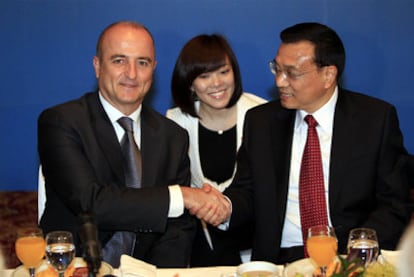China pens accords with Spanish firms worth 5.6 billion euros
Repsol big winner as executive Vice Premier Li Keqiang doles out trade deals
Spain and China on Wednesday signed 16 bilateral agreements- a dozen in the private sector- totaling 5.6 billion eurosin investments, officials said.
The announcement of the agreements was the highlight of a visit by China's executive Vice Premier Li Keqiang, who met on Wednesday with Prime Minister José Luis Rodríguez Zapatero, and brought with him a robust trade delegation. Most of the contracts penned were with Repsol and had been previously ironed out last October.
Both Li and Zapatero agreed to hike bilateral trade to 40 billion euros this year.
During his encounters with Zapatero and King Juan Carlos, Li expressed his country's confidence in the Spanish economy and lauded the Socialist government's austerity measures, saying that if the government stayed on the right track, in two years Spain could become the leader in growth among European Union members.
The Chinese deputy premier also reiterated his country's commitment to Spanish debt. According to The Financial Times, around 10 percent of Spain's debt is in the hands of the Central Bank of China.
Former Economy Minister Pedro Solbes, who was on hand for some of the ceremonies, said that the statements made by the Chinese authorities in respect to the purchase of Spanish debt "should be taken as highly positive," not only because of "what it means to Spain and indirectly to the euro but also because of what it implies to the sensibility of the markets at this time."
"The Chinese authorities have sent a clear message of confidence about the future of our economy, siding with those of us who believe that the steps the government is taking will allow us to emerge from the crisis," Solbes told EL PAÍS.
Among the initiatives are the Beijing government's promise to encourage China's 1.3 billion citizens to spend their holidays in Spain and to lift barriers to make it easier for Spaniards to invest in China.
Representatives from nearly 50 Spanish firms - including Ferroatlántica, Grupo Antolín, Indra, Técnicas Reunidas, Gamesa and CAF - were on hand at the Foreign Trade Institute (ICEX) to discuss and sign deals with the Chinese trade delegation.
According to ICEX, one of the newest agreements to have come out of Li's visit were a memorandum of understanding signed between Banco Bilbao Vizcaya Argentaria (BBVA) and the Chinese Development Bank, which pledges to strengthen relations between the two institutions in Spain and in third countries where both entities have a mutual presence. Another novel agreement, according to ICEX, was the commitment signed by Vodafone and Chinese telecommunications representatives aimed at starting up a joint research and development center.
Leading Spanish information technology company Indra IT also signed two contracts for 19 million euros with the Chinese Civil Aviation Administration's Air Traffic Management Bureau to set up air traffic control systems at two airports in China.
Among the other notable contracts, according to ICEX, were pledges signed between ENSA and Shanghai Electric Corporation (Senpec) for the purchase of two steam generators for the Sanmen nuclear plant, which is expected to commence operations by November 2013, in Zhejiang province.
Some officials- such as Solbes, who was on hand at some of the ceremonies- told reporters that Li had praised Spanish companies for holding up during the economic crisis.
The visit by the 55-year-old Li is part of a European tour that will also take the Chinese leader to Britain and Germany. He is one of the newest members of the permanent committee of China's Communist Party politburo. Since his appointment to executive vice premier in 2008, political observers believe that the politburo is preparing to replace premier Wen Jiabao next year.

Tu suscripción se está usando en otro dispositivo
¿Quieres añadir otro usuario a tu suscripción?
Si continúas leyendo en este dispositivo, no se podrá leer en el otro.
FlechaTu suscripción se está usando en otro dispositivo y solo puedes acceder a EL PAÍS desde un dispositivo a la vez.
Si quieres compartir tu cuenta, cambia tu suscripción a la modalidad Premium, así podrás añadir otro usuario. Cada uno accederá con su propia cuenta de email, lo que os permitirá personalizar vuestra experiencia en EL PAÍS.
¿Tienes una suscripción de empresa? Accede aquí para contratar más cuentas.
En el caso de no saber quién está usando tu cuenta, te recomendamos cambiar tu contraseña aquí.
Si decides continuar compartiendo tu cuenta, este mensaje se mostrará en tu dispositivo y en el de la otra persona que está usando tu cuenta de forma indefinida, afectando a tu experiencia de lectura. Puedes consultar aquí los términos y condiciones de la suscripción digital.








































